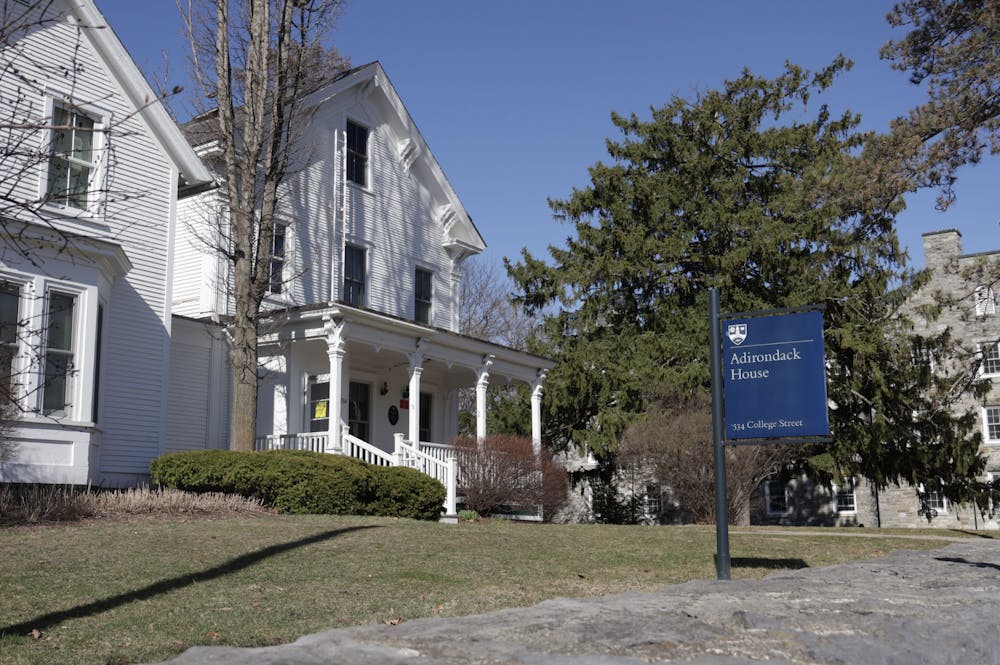Last month, the organizations Black Student Union (BSU) and Black Students Heard (BSH) launched a public initiative to reclaim the Adirondack House (ADK) as an affinity space for Black students, citing historical promises by the college and what they see as an urgent need for community building at Middlebury.
Some of the campaign’s concrete demands are to reallocate space inside ADK to house offices for the Black Studies Program, provide BSU priority booking for Coltrane Lounge, renovate the lounge and designate rooms as affinity housing for Black students.
In an email to The Campus, Residential Life said they had not heard of the proposition and did not comment on the outlined measures.
Located at 534 College Street, ADK is currently used as student housing for juniors and seniors, but the house has been historically designated for Black students. In 1973, the college declared Coltrane Lounge in ADK to be an affinity space for the BSU, known at the time as Black Students for Mutual Understanding. Since then, however, stewardship of ADK and the lounge has changed as a result of administrative decisions over the years.
Current BSU president Che DeFreitas ’27 said he supports the measures outlined for ADK in the organization’s proposal.
“We would have a space that is for Black students, as we would have a physical space on campus to host. It is important for Middlebury to show its Black students that we are cared for and valued,” DeFreitas said.
Last year’s president of BSU Arsema Lecko ’26 also shared the importance of prioritizing a space for Black students on campus. In light of the Trump administration’s recent attacks on diversity and inclusion policies in higher education, they reiterated the need for Middlebury College to demonstrate its mission of protecting students with tangible actions.
“Regardless of if there are eight students or 200 students, there should still be a space for them to feel safe,” Lecko said.
After learning about the history of the building and lounge, members of last year’s BSU board along with the group Black Students Heard (BSH) wrote a proposal advocating for a Black affinity space outside of PALANA and the AFC.
“Spaces designated for People of Color are not solely intended for Black students… In an environment where the Black populations are a minority, their needs, even in these affinity spaces, can quickly get overshadowed,” the petition states.
Lecko said they have worked with the movement since its inception after learning about the history of ADK during the organization’s annual Black Girl Brunch at Mitchell Green Lounge. The event is typically held in Coltrane Lounge, and the new location — which was chosen due to scheduling conflicts — surprised the alumni in attendance.
“They were like, ‘Why would Coltrane be busy, that's your space?’” Lecko told The Campus. “They explained to us then that it used to be the BSU space for meetings and events. From that, we were so confused and intrigued.”
Lecko and other board members then contacted Middlebury Special Collections to search for information about the space.
“We found articles and records that Coltrane was given to the Black Students for Mutual Understanding,” Lecko said, adding that the ongoing national discourse surrounding the Civil Rights Movement and racial tension impacted the decision to designate ADK for the organization. “Basically, they were facing too much of the social and political impacts of what was going on nationally, on campus.”
While researching this history, Lecko connected with former BSU President Leroy Nesbitt ’82, who was also the first faculty member to serve as Special Assistant to the President, a role he held from 1992 to 2008. When he was a student, Nesbitt felt that Adirondack House and Coltrane offered Black students a sense of place and belonging at Middlebury.
“Coltrane enriched the lives of everyone on campus including faculty, staff, students,” he said.
Coltrane Lounge once hosted everything from social events to debates to talks from prominent figures like Betty Shabaz, a civil rights activist and the wife of Malcom X. Nesbitt said that during his time at the college the space was a hub of Black culture and intellect, but also hosted broader conversations surrounding social issues.
The space has drastically changed since when Nesbitt was a student, however.
“Coltrane Lounge, the second floor and the kitchen [of ADK] were operated by the BSU, they had the keys,” Nesbitt said, adding that the ownership change stemmed from the lack of space. “At some point, the college took back the space because they needed the space for school.”
Currently, the process for booking Coltrane Lounge through Events Management is the same no matter which organization wants to use the space. Under the proposed plan, BSU would have the ability to review external requests to book the lounge, empowering them to reserve Coltrane for club events and to preserve the integrity of the space.
“There is an ongoing struggle with the college deciding which spaces can be used for student activities and organizational space, outside of this issue. How can the college support student organizations and provide the spaces they need?” he added.
The Covid-19 pandemic’s health and living policies also affected the space’s use, leading to the eventual dissolvement of BSU’s ties to Adirondack House.
In addition to reallocating spaces for affinity housing and workspaces for the Black Studies Program, the BSU proposal also seeks to add elevator access to the second floor of ADK and to create a new library to enhance the Black Studies’ academic spaces.
During her time at Middlebury, Mildred Reese ’70, the founder of Black Students for Mutual Understanding, made the space the group’s own. Reese and her peers were admitted after the assassination of Martin Luther King Jr. At 16 students, they were the then-largest group of Black students ever admitted into Middlebury. Lecko met with Reese last year while drafting the proposal, and remembers Reese being especially disappointed when she heard that the Lounge had been lost, adding that she and her peers spent a lot of time cleaning and renovating the space to make it their own, only to have it lost decades later.
Although the proposal would prioritize the Black Student Union’s autonomy over Coltrane Lounge and large spaces in ADK, the student organizers emphasized their goal is to build intentional community at Middlebury, not to divide the student body.
“It’s very important that there is an initiative to prioritize Black students. But that doesn't mean it neglects other students. We can’t be grouped into a monolith, which is what the administration keeps on trying to do. It’s not fair for leaders of these spaces to make everyone feel welcomed and represented, it’s near-impossible,” Lecko said.
On top of the goals outlined in the proposal, the student organizers said they want the campus community to recognize the history of ADK and Coltrane and remember the commitment Middlebury made in 1973 to Black students on campus.
“We’re not asking for a brand-new Black space, we’re just asking for something that originally belonged to the BSU. We’re just asking to get something back,” Lecko said.
Norah Khan '27 (she/her) is an Arts & Culture editor.
She is planning to major Political Science with a possible minor in Spanish. Outside of The Campus she is also involved with JusTalks, Matriculate.org, College Democrats, QuestBridge and the Rohatyn Global Fellows Program. Norah enjoys reading, running, listening to podcasts and drinking a good cup of chai.




